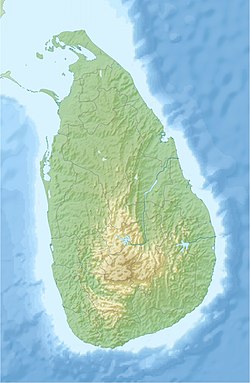Portal:Sri Lanka/Intro

Sri Lanka (/sriː ˈlɑːŋkə, -ˈlæŋkə/ or /ʃriː-/ ; Sinhalese: ශ්රී ලංකා Śrī Laṃkā, Tamil: இலங்கை Ilaṅkai) is an island country located southeast of India and northeast of the Maldives. The island is home to many cultures, languages and races. The majority of the population is from the Sinhalese ethnicity, while a large minority of Tamils have also played an influential role in the island's history; Christians in both groups are recent converts who have kept the traditional culture. Moors, Burghers, Malays, Kaffirs, and the aboriginal Vedda are also established groups on the island.
Sri Lanka's documented history spans 3,000 years, with evidence of pre-historic human settlements dating back to at least 125,000 years. It has a rich cultural heritage and the first known Buddhist writings of Sri Lanka, the Pāli Canon, date back to the Fourth Buddhist council in 29 BC. Its geographic location and deep harbours made it of great strategic importance from the time of the ancient Silk Road through to the modern Maritime Silk Road.
Sri Lanka was known from the beginning of British colonial rule until 1972 as Ceylon (/sɪˈlɒn, seɪ-, siː-/). Its recent history has been marred by a thirty-year civil war which decisively ended when the Sri Lankan military defeated the Liberation Tigers of Tamil Eelam (LTTE) in 2009.
The country has had a long history of international engagement, as a founding member of the South Asian Association for Regional Cooperation (SAARC), and a member of the United Nations, the Commonwealth of Nations, the G77, and the Non-Aligned Movement. Along with the Maldives, Sri Lanka is one of only two South Asian countries rated "high" on the Human Development Index (HDI), with its HDI rating and per capita income the highest among South Asian nations.
The legislative capital, Sri Jayawardenepura Kotte, is a suburb of the commercial capital and largest city, Colombo.
